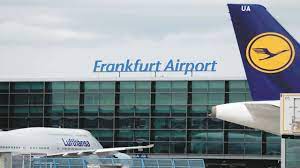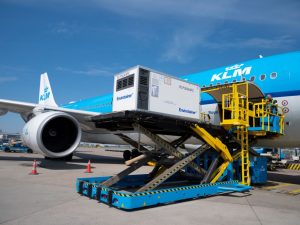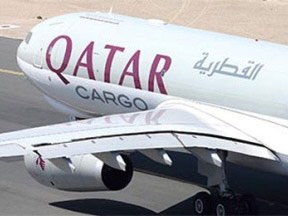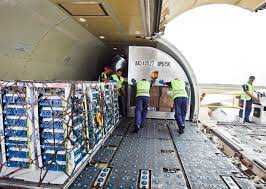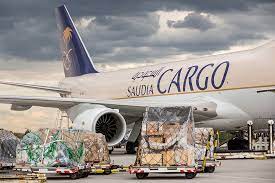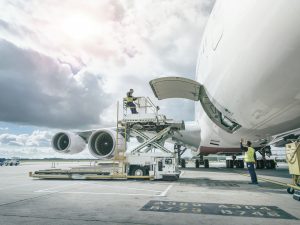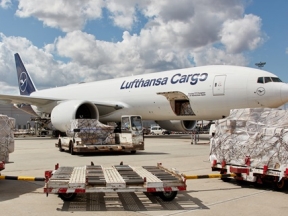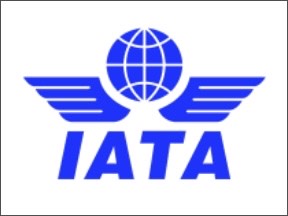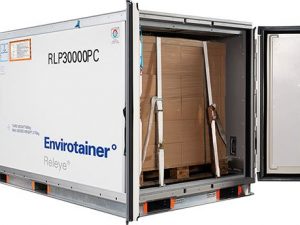Frankfurt Airport handled record volumes of cargo last year despite a reduction in bellyhold capacity. The German hub – which is also the largest cargo airport in Europe – handled a record 2.3m metric tons of cargo last year. This figure is up 18.7% on 2020 levels and 8.9% ahead of the pre-pandemic year 2019. The airport said that airfreight was the main driver behind this growth, while airmail continued to be affected by the lack of belly capacity on passenger aircraft. Airport operator Fraport’s chief executive, Stefan Schulte, said: “Throughout 2021, the Covid-19 pandemic continued to have a massive impact on Frankfurt Airport. Passenger traffic recovered gradually in the course of the year – even rising threefold in the April-to-December 2021 period compared to 2020 – but we are still far away from the pre-pandemic levels of 2019. Cargo traffic, in contrast, saw very positive growth in 2021. Airfreight volumes in Frankfurt even reached a new annual record, despite the ongoing shortage of belly capacity on passenger flights and other challenges. This underscores our role as one of Europe’s leading cargo hubs.”
Read More »Air France KLM Martinair Cargo & Envirotainer collaborates on sustainability
Envirotainer and Air France KLM Martinair Cargo (AFKLMP Cargo), the leading airline in pharmaceutical logistics, announced their collaboration on sustainability. Envirotainer and Air France KLM Martinair Cargo each have a strong focus on sustainability and are pursuing multiple initiatives with a view to achieving more sustainable operations. Being long-term close partners, both organisations sought to strengthen the initiatives by collaboration. Air France KLM Martinair Cargo has approved the newly introduced Envirotainer Releye® container and is in the process of implementing it in its booking system as part of its product portfolio. The Releye provides outstanding environmental performance, delivering up to 90% reduction in CO2 emissions compared to available passive solutions, based on life-cycle analysis. Envirotainer will reduce the impact of the use of its containers on the environment by investing in Sustainable Aviation Fuel (SAF). SAF offers a cleaner alternative for conventional jet fuel. SAF is produced from sustainable feedstock, such as cooking oil, animal waste or solid waste from homes and businesses. It reduces CO2 emissions by up to 85%, when compared to conventional jet fuel. The reduction occurs throughout the entire lifecycle of producing and using sustainable aviation fuel compared to that of fossil fuel.
Read More »Cargo-only direct flights from Bengaluru to Munich
Expanding their cargo network, the Munich Airport announced the increase in its cargo-only services with Qatar Airways. As per the details of Qatar Airways’ new route, the flight takes off on Monday from Bengaluru, halts in Doha (Qatar’s capital), leads onto Munich and then further to Chicago. The return flight from Chicago reaches Munich every Tuesday. The first flight departed on 10 January with 100 tonnes of cargo to Germany and the US, and caters to the pharmaceutical, automotive, and other industries. Qatar Airways operates this service on behalf of DB Schenker. The international logistics provider made recent announcement about its plans to expand global flight operations in India. The double benefit of the new weekly flight operations includes marking the Qatar Airways’ leadership in air freight services in India, and the expansion of Munich’s cargo network with more significant destinations.
Read More »UPS announces new freighter flight between Billund & Cologne
UPS has added a new freighter flight between Billund in Denmark and its European air hub in Cologne as it looks to meet growing e-commerce demand. The new daily B737F flight means that Danish businesses in the Jutland peninsula, including Vejle, Herning and Horsens will benefit from later pick-up cut off times with packages spending less time in transit. “With collection up to two hours later in place such as Vejle, companies can take advantage of reduced transit time for packages being exported internationally, and potentially increase time in production for goods,” UPS said. Michiel van Veen, managing director, UPS Nordics, added: “We are continuing to develop our European network to meet the growing e-commerce demand for the region. “The launch of the Billund flight will present opportunities for businesses of all sizes in Denmark to expand into global markets faster, thanks to a new connection to our global air network.”
Read More »Saudia Cargo hopes to add Europe-US freighter flights
Saudi Arabian Airlines is hoping to add a new freighter service between Europe and the US but has met some resistance from US carriers over the plans. In late December, the carrier applied to the US Department of Transportation for a limited exemption for seventh freedom rights to operate all-cargo flights between Liege, New York JFK and Chicago O’Hare. However, US carriers responded that they do not have seventh freedom rights to operate flights to Saudi Arabia and also questioned whether the flights are in the public interest. In response, Saudi Arabian said it would consult with the country’s government about the possibility of providing reciprocal seventh-freedom rights to US all-cargo carriers. The carrier also argued that the flights would be in the public’s interest. Saudi Arabian Airlines believes that this limited exemption is requested in order to serve the public interest by helping to alleviate the supply chain delays caused by the increased volume of air cargo between Europe and the US due to the Covid-19 pandemic.
Read More »New dates announced for air cargo INDIA due to COVID concerns
In view of the rising COVID concerns, Messe Muenchen India, the organizers of air cargo INDIA have announced the postponement of the biennial trade show and conference for the air cargo fraternity. The new dates for the much-awaited industry event are May 31 – June 2, 2022 and will be held at the Grand Hyatt, Mumbai. This decision was taken by Messe Muenchen India owing to the current COVID restrictions and was made in close consultation with all the exhibitors, sponsors, industry associations and partners. “We would like to thank all partners for their continued support & cooperation in making this difficult and time sensitive decision. We are pleased that together we could have a general consensus and arrive at the new dates without affecting the plans of all involved and intended outcomes.” said Bhupinder Singh, CEO, Messe Muenchen India Pvt. Ltd. “TIACA supports the decision of Air Cargo India to postpone until May considering the current situation in India and we look forward to participating fully at that time with many international delegates. We also look forward to welcoming delegates to the joint TIACA / Messe München event in San Francisco, scheduled for the end of March.” said Glyn Hughes, Director General, TIACA With the 2022 edition of air cargo INDIA, the focus is on future trends, sustainability, latest innovations in the air cargo industry.
Read More »Ethiopian Cargo and logistics services avails online air cargo pooking platform
Ethiopian Cargo & Logistics Services, has launched a new feature that enables customers to make online reservations for their cargo. The platform enables customers check flight schedules, space availability, loadability of freight and make real-time booking of their shipment in single and convenient way on cargobooking.ethiopianairlines.com. Ethiopian Cargo & Logistics Services is rolling out the online booking subsequent to its introduction of the mobile application to heighten its customer’s experience. The Mobile App which is available for Android and IOS, brings convenience to customers with a real-time update through a range of self-service features. On the Mobile App, customers can check flight schedule, submit enquiry, receive notifications when the shipment is ready, book charter flights and track shipments. Ethiopian Airlines GCEO, Tewolde GebreMariam, said “We are pleased to offer our customers with convenience in their experience of air cargo booking. We are committed to start walking the long walk of taking out paper from entire air cargo process by digitalizing the logistics value chain. Taking out paper from logistics value chain is not only convenient and hassle free service for customers but also it delivers more efficient operational excellence and achieves long term sustainability goals. Our online booking platform will be crucial in empowering direct cargo customers and forwarders with reliable access to our cargo capacity inventory. Besides, our cargo division has proved to the world that it is a genuine partner in times of dire need by delivering lifesaving PPE’s (personal Protective Equipment) and hundreds of millions various vaccines to all major continents of the world.” Ethiopian provides its customers with fully automated cargo service using the latest technologies for data, information and market intelligence with 100% e-AWB from …
Read More »Lufthansa and DB Schenker signs up with Lenovo for SAF flights
IT hardware firm Lenovo has signed up to use the “carbon neutral” freighter service offered by DB Schenker and Lufthansa Cargo. The tie up will see the computer company transport cargo, including include laptops, notebooks, and PCs, on Lufthansa Cargo’s Sustainable Aviation Fuel (SAF) powered B777 freighter flight between Shanghai and Frankfurt. The partners have calculated that by using the flights, Lenovo will save around 20 tons of conventional kerosene per flight and, thus, 62 tons of greenhouse gases weekly. In addition, the around 16 tons CO2 resulting from the production and transport of the SAF are offset by compensatory measures. Ashwin Bhat, chief commercial officer, Lufthansa Cargo, said: “Our joint effort with DB Schenker to avoid CO2 emissions is continuously growing stronger. An increasing number of customers realise that we need to work together across industries to achieve our shared goal.” Gareth Davies, head of global logistics at Lenovo, added: “Sustainability is critical to our business and mission of delivering smarter technology for all. We are proud that we are further enhancing our solutions through this collaboration with DB Schenker and Lufthansa Cargo.”
Read More »Supply Chain disruptions halve November air cargo growth
The International Air Transport Association (IATA) released data for global air cargo markets showing slower growth in November 2021. Supply chain disruptions and capacity constraints impacted demand, despite economic conditions remaining favorable for the sector. As comparisons between 2021 and 2020 monthly results are distorted by the extraordinary impact of COVID-19, unless otherwise noted, all comparisons below are to November 2019 which followed a normal demand pattern. • Global demand, measured in cargo tonne-kilometres (CTKs*), was up 3.7% compared to November 2019 (4.2% for international operations). This was significantly lower than the 8.2% growth seen in October 2021 (9.2% for international operations) and in previous months. * Capacity was 7.6% below November 2019 (-7.9% for international operations). This was relatively unchanged from October. Capacity remains constrained with bottlenecks at key hubs. • Economic conditions continue to support air cargo growth, however supply chain disruptions are slowing growth. “Air cargo growth was halved in November compared to October because of supply chain disruptions. All economic indicators pointed towards continued strong demand, but the pressures of labor shortages and constraints across the logistics system unexpectedly resulted in lost growth opportunities. Manufacturers, for example, were unable to get vital goods to where they were needed, including PPE. Governments must act quickly to relieve pressure on global supply chains before it permanently dents the shape of the economic recovery from COVID-19,” said Willie Walsh, IATA’s Director General.
Read More »Delta Cargo approves Envirotainer Releye® RLP container for it’s airline
Envirotainer, the global market leader in secure cold chain solutions for air transportation of pharmaceuticals, announced that Delta Cargo has approved the Envirotainer Releye® RLP for usage on their fleet of aircrafts. With this approval, Delta Cargo can now transport the Releye® RLP on their wide-reaching global network, increasing the capacity to meet the ever-growing need for temperature-controlled, high-quality, connected ULD solutions. The Releye provides outstanding environmental performance, delivering up to 90% reduction in CO2 emissions compared to available passive solutions, based on life-cycle analysis. The Releye® RLP uses rechargeable batteries to power its electric heating and compressor cooling system and can power its system for over 170 hours on a single charge. With its unique feature set, the Releye® RLP sets a new standard for secure cold chain solutions bringing a temperature-controlled air freight container to market with a new footprint, industry-leading autonomy and fully integrated live monitoring. “The introduction of the Releye® RLP, in combination with our CEIV certified pharma network, provides our customers with more choice when looking for reliable container options to support the growing demand for pharma and vaccine shipments” said Jannie Davel, Managing Director Cargo Commercial at Delta Cargo.
Read More » Cargo Breaking News
Cargo Breaking News
